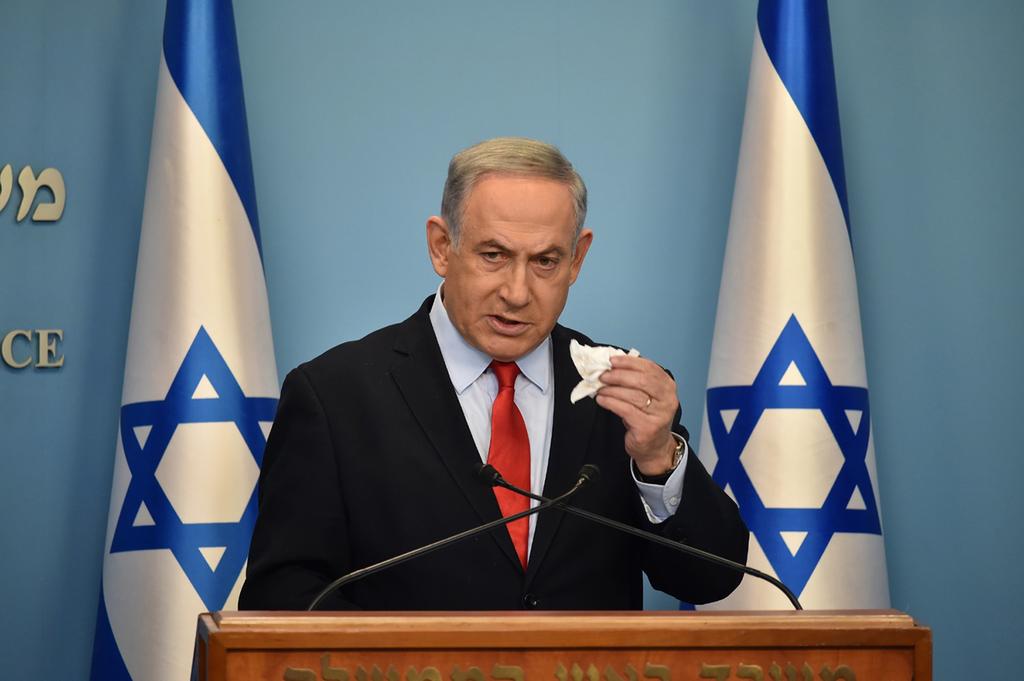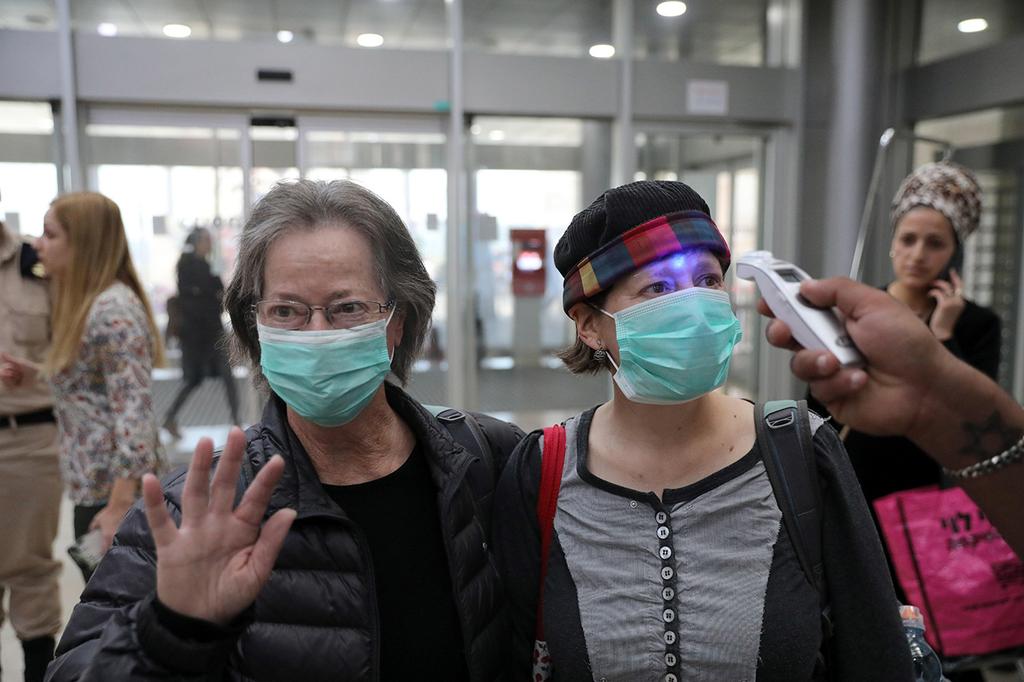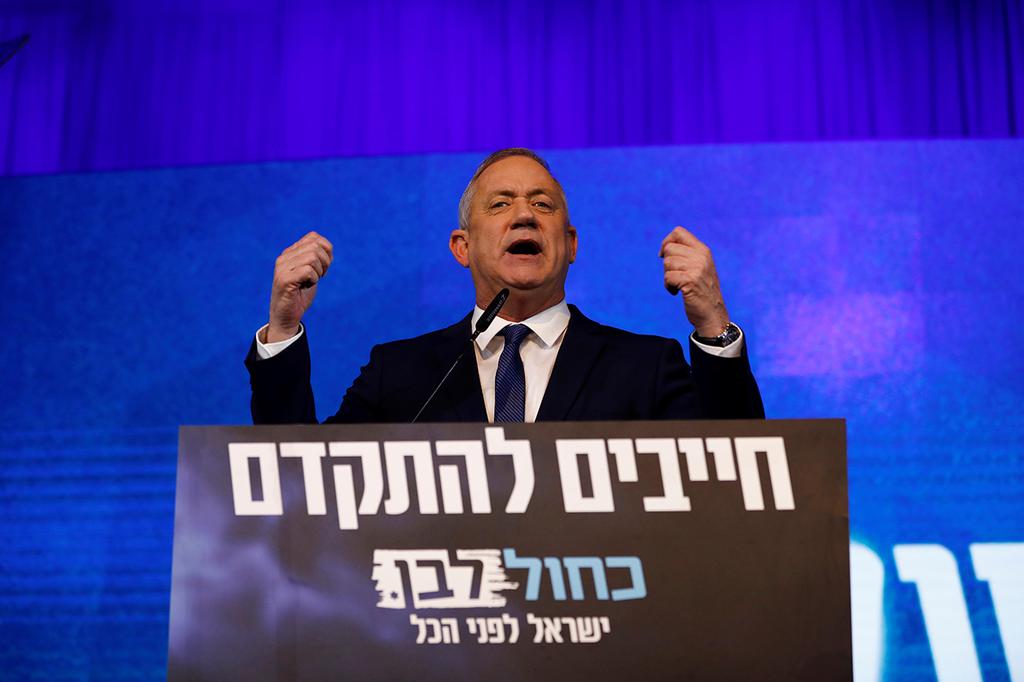Getting your Trinity Audio player ready...
Prime Minister Benjamin Netanyahu called Thursday for Benny Gantz's centrist Blue & White party to join an emergency government to confront a growing crisis over the coronavirus, offering a potential way out of the deadlock that has paralyzed the political system for the past year.
Gantz said in response that he was open to discussing the proposal.
Netanyahu made the offer in a nationally televised address, saying the virus does "not differentiate" between Jews and non-Jews or between the political left and right.
3 View gallery


Benjamin Netanyahu discusses countering the coronavirus in a televised address Thursday
(Photo: Yoav Dudkevitch)
"I call for the formation now, even this evening, of a national emergency government," he said.
"It will be an emergency government for a limited period. Together, we will fight to save the lives of citizens," he added, saying that politics should be put aside.
Gantz said Thursday that in light of the coronavirus crisis and the new harsh guidelines to combat it, it was appropriate to discuss setting up such a coalition.
"As we have done so far, we will continue to responsibly act to ensure the well being of the public," he said.
"In light of the situation, we would be willing to discuss the establishment of a broad national emergency government that would include representation of the whole political spectrum. We will continue to promote such a move for the citizens and the State of Israel," he said.
The conciliatory language from the two leaders marked a sharp change after months of acrimonious campaigning and heightened rhetoric in the wake of another inconclusive election earlier this month, the third in less than a year.
President Reuven Rivlin praised the proposal, telling Netanyahu that he welcomed any initiative that would lead to the establishment of a government as soon as possible to help combat the coronavirus and break the year-long political deadlock.
"We must do everything possible to focus on the tasks ahead of us," said Rivlin, who has been pressing for a unity government since September. "My home is open to you."
Israel has been relatively insulated from the coronavirus scare, with just over 100 cases diagnosed so far. But the numbers have begun to creep upward in recent days.
3 View gallery


Israelis wearing masks against coronavirus have their temperatures taken at the entrance to Hadassah Ein Kerem
(צילום: EPA)
The government has imposed a number of tough restrictions to slow the spread of the virus, placing tens of thousands of people into protective home quarantine, ordering all nationals who return from overseas into quarantine and barring almost all tourists from entering the country.
Netanyahu also announced that schools and universities would be closed through the end of the Passover holiday in mid-April, with the exception of preschools, boarding schools and special education facilities.
The Health Ministry this week barred all gatherings of more than 100 people.
Netanyahu's Likud emerged as the single largest party in the March 2 vote, but fell short of securing a majority of Knesset seats required to form a stable government.
Although a slight majority of MKs oppose Netanyahu, they are deeply divided on other issues. Gantz also appears to lack enough support to form a government.
A unity government between the two large parties would be the most straightforward way out of the crisis.
But after three contentious campaigns, there is great animosity between the two leaders, and it remains unclear who would lead a unity government. Still, the growing coronavirus threat may be the spark that brings the sides together.
Gantz has previously ruled out a partnership with Netanyahu, citing the prime minister's upcoming trial on corruption charges, which is set to begin next week.
Netanyahu has insisted that he lead any unity government.
Citing the urgent health crisis, Gantz appeared to be open to compromise with Netanyahu earlier Thursday.
"Blue and White, under my leadership, will support every appropriate measure, putting aside political considerations entirely, at this complex and sensitive time," he said.
There was no immediate comment from Gantz on Netanyahu's proposal for a unity government.


